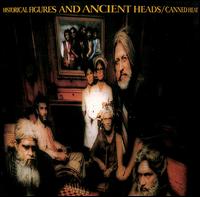This article needs additional citations for verification .(March 2025) |
| Historical Figures and Ancient Heads | ||||
|---|---|---|---|---|
 | ||||
| Studio album by | ||||
| Released | December 14, 1971 | |||
| Recorded | 1971 | |||
| Studio | Village Recorder, Los Angeles | |||
| Genre | Blues rock | |||
| Length | 36:28 | |||
| Label | United Artists | |||
| Producer | Skip Taylor, Jim Taylor | |||
| Canned Heat chronology | ||||
| ||||
| Review scores | |
|---|---|
| Source | Rating |
| AllMusic | |
| Christgau's Record Guide | C− [2] |
Historical Figures and Ancient Heads is the eighth album by American blues rock band Canned Heat, released in 1971. It was the first album not to feature original member and songwriter Alan Wilson who had died the previous year, and their bassist Larry Taylor, who had left to join John Mayall's band. Featuring new guitarman Joel Scott Hill and Little Richard on "Rockin' With the King". The record also includes Tony de la Barreda on bass, who left with Hill after this album and subsequent tour.